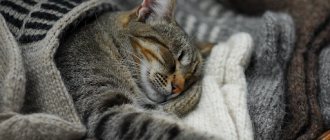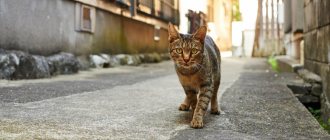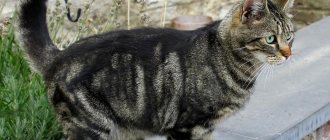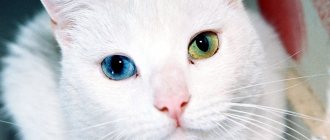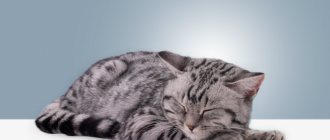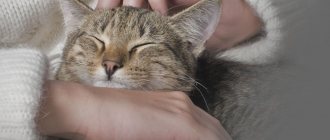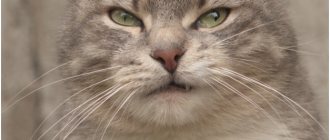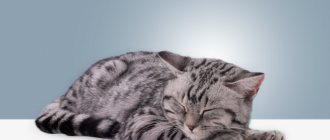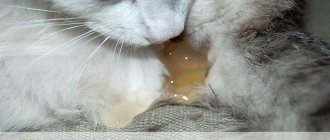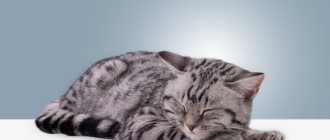Many owners find it unclear why cats bring home killed animals when the bowl is constantly filled with tasty food. When you meet your favorite cat on a walk, you often find a dangling mouse tail or a small bird in its teeth. It happens that a gift is waiting in the morning on the floor by the bed, or even on the pillow. In order to respond correctly to the situation that has arisen, you need to know the motives that guide your pet.
Where to put the loot
When a domestic cat catches mice and brings them home, you need to be able to properly accept such “gifts.”
The prey must be extremely carefully, observing all hygiene standards (wearing gloves), placed in a jar, bag or box and thrown away. Cats shouldn't be around
She must assume that her catch, brought home, was eaten by the owner. After the procedure, gloves should be thrown away and hands should be washed with antibacterial soap.
But, since an animal brought home can become a threat to the health of the cat’s owner, one should try to reduce such “supply of provisions” to a minimum.
The mouse crossed the road
If a mouse crosses the path of a person, then this is regarded as an unfavorable sign. To obtain an accurate interpretation, you will have to pay attention to the following details:
- The mouse brazenly runs across the path, not afraid of anything - the person faces minor troubles and a streak of failures.
- Crosses the path several times. According to signs, such behavior of the animal warns of mortal danger lurking ahead. For safety reasons, beliefs recommend that you immediately turn around and go home, putting things off until later.
- A light-colored mouse crossed the path - the person expects financial support from an influential friend.
- The mouse slowly crosses the path and squeaks at the same time - it is expected that conflicts and problems will be resolved in favor of the person, good luck and luck await ahead. This situation also means that the person is on the right path.
Parental instinct
Even the most expensive and delicious cat food cannot dampen the parental instinct if there are kittens in the house. In such situations, the cat strives to teach its offspring to eat properly. To show a clear example, she brings home half-dead or dead animals to the kittens. The cubs are attracted by the process of playing with the prey and the smell of fresh game; they enthusiastically watch their mother and even try to imitate her.
Neutered cats are no exception; they also have a parental instinct that extends to the owner. If one day you see a dead rat in the kitchen, there is a chance that your pet just wants to introduce you to what she thinks is the right diet.
Maternal care
Many cats bring their prey to their owner just because they are trying to take care of him. This is how their maternal instinct manifests itself. From their point of view, a person is a stupid fool who does not know how to get his own food. If you don't feed him, he will either die of hunger or continue to eat all sorts of nasty things.
The cat may even try to teach its owner to hunt birds and mice. In this case, the caught victim is a kind of “educational aid” for a person who does not know how to properly obtain food for himself.
This behavior is typical for both sterilized cats and those who have not had surgery. Sterilized pets do not have the opportunity to fulfill the maternal program, so they direct all their love, attention and care to their owners.
How to react to the owner
First of all, it is necessary to suppress negative feelings, if any, and praise the animal for the care shown. Cats, like all highly organized pets, are very dependent on the approval of their owners. If in this situation you scold or, even more so, beat the cat, you can forever lose the pet’s trust.
If a cat brings a dead animal into the house, the main thing is not to scold it.
You should not react too emotionally and immediately get rid of the gift. Typically, the prey is already dead and poses no threat. However, it still remains a source of various diseases, so it needs to be eliminated. Before this, it is advisable to place the cat in another room: the hunter is unlikely to appreciate such a disdainful attitude towards her offerings. The corpse itself should be placed in a bag and thrown into the trash.
How to react to the owner
Having understood the reasons why the cat brings mice to the owner, it is necessary to develop the correct behavior in such a situation. First of all, you should not scold or show negative emotions at the sight of a dead bird or mouse, as if
If a pet, which had the best intentions of feeding or teaching its owner to hunt, is scolded, punished or shown displeasure, this can cause a feeling of mistrust and alienation in the animal.
If you find a dead rodent, bird or other trophy in your home, household members should not panic. As a rule, the prey is already dead and poses no threat. If a hunting trophy shows signs of life, then measures must be taken to kill it safely.
In order not to offend your pet with your inattention, you should thank the animal for the trust shown, caress it and, if possible, remove it to another room. The carcass must be placed in a plastic bag and, sealed tightly, thrown into a trash bin
You must wear gloves and then wash your hands thoroughly with soap. The cat should not be present during this manipulation, otherwise it will lose trust and disposition towards its beloved owner.
Bringing a trophy is a way to attract attention
The pet may be severely lacking in care, affection and love. It happens that people spend a lot of time at work and do not have the opportunity to play with their cat. Therefore, she tries to attract attention to herself by regularly dragging home dead birds and mice. The only way out of this situation is to spend as much time as possible with your pet. You definitely need to play with him. Give your cat the warmth and affection that he clearly lacks. Then he will stop bringing you “unpleasant gifts.”
Why do cats carry dead animals home?
Representatives of the cat family, living side by side with humans for several thousand years, managed to retain most of their instincts inherited from their wild ancestors. Many of them explain the fact why cats sometimes carry their prey to their owners. Among them:
- Hunting instinct. The body of predators, which are representatives of the cat family, requires large amounts of protein. A cat's main diet should be meat. Therefore, hunting habits are inherent in this animal by nature. Interestingly, the main thing is to catch the prey, and not to eat it. Having brought a mouse or a bird to the feet of the owner, the cat thus proudly demonstrates its success, asserting itself and showing masculinity. Many pets amaze with their ability to hunt not only mice, but also aquarium fish, insects, and lizards.
- Parental instinct. Similar behavior appears in females. In the wild, predators bring small killed animals and birds to their cubs, thereby teaching them to eat properly and then to hunt. Modern domestic cats also have a similar parental instinct. Females with kittens often bring half-dead prey into the house to their babies, who react to it with great interest. If there are no offspring to whom the accumulated experience can be passed on, the animal chooses the owner to fill this role. The cat brings the caught prey to him, thereby demonstrating its care.
- Mice and birds laid out on the floor, on the owner’s bed - the cat’s desire to declare the benefits it brings, to earn a little praise and gain recognition. This is another one of the instincts characteristic of domestic fluffies.
Whatever of these reasons may have caused the appearance of animals killed by a cat in the house, you should not punish or scold her for this.
conclusions
If you find a lifeless carcass of a rodent or bird in your apartment in the morning, do not rush into hysterics. This is how your pet realizes its hunting instinct. Be sure to thank her for the work done and get rid of the corpse without her noticing. Remember that street animals are sources of disease, and try to find an alternative to live prey for your pet.
All cat lovers know that these graceful, furry animals are dexterous and successful hunters. Pets often bring their prey to the owner. Zoologists note several reasons why cats carry dead animals home. The owner should know not only the subtleties of animal psychology in relation to cats, but also what actions to take if hunting trophies are discovered in the house.
Read in this article
Reasons for this phenomenon
Cats were domesticated by humans more than 10 thousand years ago in ancient Egypt. And until now, most of them manage to retain their instincts.
shutterstock
Cats carry dead animals home for the following reasons:
- Hunter's instinct. All cats require large amounts of protein, so the basis of their diet is meat, which they are used to getting during hunting. An interesting fact is that eating prey is not the goal of hunting. When a cat brings dead animals home to the feet of its owner, it shows its success, courage and dexterity, thereby asserting itself as a hunter. It’s not for nothing that nature gave her tenacious claws, sharp fangs, excellent vision, sensitive hearing and a developed vestibular apparatus
- Insects, mice, moles, birds, lizards brought home, and even aquarium fish can become victims of such instincts. Kittens begin to show their instinct as early as three months of age, when they try to catch their mother’s tail or objects that elude them. But cats hunt not only for food, but also for pleasure and fun. After all, living at home and regularly receiving tasty food, the pet simply does not need additional food, and he brings home the killed animal for play.
- Showing concern. In the wild, cats bring killed animals to their kittens. Thus, they teach their offspring proper nutrition and a hunting lifestyle. When there is not a single kitten in the house, the cat shows its parental instinct towards the owner. If, however, a pet perceives a person as an adult creature, then having brought home a dead animal, he simply shares the prey, as would happen in the wild when united with other cat families.
- Showing gratitude. Having brought a dead mouse to the owner’s bed or on the doorstep, the animal makes a “gift” to the person, thanking him for the warmth and love that he gives him. Therefore, having received swearing or screams in response to such an act, the cat may completely lose trust in its partner or, even worse, begin to be afraid of him.
- Showing your importance. Having brought home and laid out dead animals on the floor, the cat expects praise from the owner and recognition of its usefulness. This pet simply needs to always know that it is useful and necessary for its owner.
- Territorial reason. By laying out killed animals around the house, the cat seems to mark the boundaries of the territory in which it is the main predator. Having shown its instinct and killed the animal, the cat does not want to part with the prey and leave it in an unknown place, that is, on the street. It is much safer, in her opinion, to bring the prey to familiar conditions, home.
It is very important to remember that when a cat brings home killed animals, you should never scold him for it.
Interesting process
This cute, fluffy, affectionate creature is a natural enemy of field mice, house mice, and rats.
Pests cannot even stand the smell of cats; they avoid their property and fear for their lives. In cats, the huntress instinct is genetically embedded. Even when well-fed, she will not miss the moment to chase a mouse that suddenly appears. The process itself gives pleasure - to catch, not to miss. But whether to kill, eat or not depends on other factors.
Interesting!
A study was conducted in the USA. They crossed purebred cats and yard cats with one cat. The kittens were swapped after they were born. Purebred cats were raised by yard cats. As a result, it turned out that everyone had developed hunting skills. Mothers regularly brought small rodents to their kittens. But further actions were different. The yard worker killed in cold blood, showed how it should be done to the kittens, and gave them to them to eat. The thoroughbred was limited to playing. The conclusion followed was that in order for kittens to start catching mice and eating them, an example is needed. Instinct alone is not enough; skills are also required.
Hunting instinct
Based on recent research, domestic cats are the most ruthless predators who love to play with their prey. Regardless of the breed, cats have a certain cruelty towards prey. There is no reason to be afraid of your pet and consider it a bloodthirsty killer if one day you see a dead bird or part of it on your bed. With this behavior, the cat does not want to scare anyone, but is waiting for praise. She demonstrates that she not only protects the territory from other animals, but also shares the food she gets with her owner.
Even those pets who are deprived of street walks are prone to hunting. The presence of an open window or balcony in the house can be a wonderful opportunity to hunt rodents, birds and bats. Unfortunately, such house hunting can end disastrously for owners living on high floors - cats often get lost or broken due to their instincts.
- Why mosquito bites itch and swell - a normal and allergic reaction to insect saliva
- Prague Rat - characteristics and description of the breed, coat type and color, keeping at home
- Pizza with mushrooms recipe with photos step by step
Why is such a hunt dangerous?
The manifestation of instincts by bringing dead animals home in cats annually leads to the death of hundreds of pets. Why? This happens for reasons such as:
- poisoning;
- diseases carried by killed animals (distemper, rabies, leptospirosis). The threat can be either in the blood or saliva of the victim, or in retaliatory bites, which are fraught with suppuration and abscesses;
- killed animals can infect a cat with a fungal disease, helminths or mites.
In addition to the above-mentioned threats, a hunting cat runs the risk of falling under the wheels of a car, into traps in a protected area, into the eyes of a formidable dog, or into other dangerous situations. When trying to bring the prey home, a meeting with wild cats may end in trouble, which may not accept a stranger, and then the matter, at best, will end in a fight.
Sometimes the cat’s hunting instinct takes on larger proportions, and the pet begins to hunt the neighbor’s pets, chickens, rabbits, chicks, ducklings, etc. For the pet itself, there may not be an open threat, but a scandal with the neighbors is guaranteed. And it’s unlikely that the owner will be pleased with the neighbor’s pets brought home.
shutterstock
Potential Hazards
Is it safe for a cat to indulge in hunting? Not as much as you would like.
Rats, often the prey of cats, are carriers of diseases such as rabies and distemper; they can also be intermediate hosts of fleas and ticks, which are often carriers of piroplasmosis and encephalitis. Birds often carry subcutaneous mites and fungal infections. In addition, street animals can “give” worms to your pet. In cities, rodents are periodically poisoned with rat poison, which, when it enters the cat’s body, kills it.
Principles of healthy eating
Biologists and doctors know that any amino acid performs two related functions - it supplies building material to protein chains and supplies the body with energy. Animals often need amino acids from outside, since they are not able to produce them themselves. Such amino acids are called essential. In cats, this is taurine - it is not produced in the body, but is responsible for the performance of its main organs.
Zoologists have found that the highest concentration of taurine is found in the retina of a cat's eye (100 times more than in the blood). This is why taurine deficiency primarily affects vision: the retina degenerates, and the animal quickly and irreversibly goes blind.
In addition, taurine takes care of the heart muscle, where it accounts for half of all free amino acids. Taurine regulates the transport (from and inside the cell) of calcium ions, facilitating heart contractions. A lack of amino acids immediately affects the activity of the cardiovascular system, causing such a terrible disease as dilated cardiomyopathy.
Taurine, recognized as an effective antioxidant, has a number of additional, but no less important tasks:
- regulation of the nervous system;
- formation of active immunity;
- normalization of blood clotting;
- maintaining reproductive functions;
- synthesis of bile salts, without which fats in the small intestine are not digested.
Return to content
Unpleasant housing energy
Esotericists believe that cats have a certain connection with the other world. They are able to see and feel what is inaccessible to human understanding.
For this reason, it is customary to let animals into a new home first, and to place a children’s bed in the place chosen by the cat.
If a pet feels unpleasant energy in a room, it will not want to live in it.
There are also several contradictory signs that explain a cat leaving home:
- If a cat runs away from home, it means that some kind of misfortune will soon befall him. Until the death of one of the owners.
- Misfortune really threatened the family, but the sensitive four-legged guard found out about it in time and took him away from the house.
- The disappearance of a pet from a home in which there is a seriously ill person is considered an extremely bad sign. It is believed that his days are numbered. However, according to another version, the cat does not prophesy death, but takes it with it.
- By leaving, the cat made room for someone else. The family is not expected to lose, but to be replenished.
Where does the soul of an animal go after death?
In order to figure out where the soul of an animal goes after death, it’s worth figuring out whether it exists at all? What do people know about this and how can they answer this question?
The soul of an animal after death probably finds some kind of refuge. In fact, everything is not as simple as it might seem at first glance. This question is worth turning to the Bible. This holy book, unfortunately, is not able to give a clear answer. After all, little is said about animals, and in general, do they have such a “privilege”. But the conclusion is quite simple, you just need to rely on the basic biblical principles.
Thus, as the Bible says, animals are capable of having a living soul. To do this, it’s worth understanding what the difference is between four-legged friends and humans? Is it possible to draw a line that intersects in one place? Where does the soul of animals go after death? As everyone knows, man was created in the image and likeness of God himself. It was this “being” that was endowed with the ability to think and develop spiritually. Animals cannot do this; they are not capable of doing everything that is given to man. Therefore, if they have a soul, then most likely it is somewhat different. After all, as mentioned above, animals cannot do even half of what is given to ordinary people. But, nevertheless, they are able to feel, love, get angry and experience other emotions.
Is there one place where all the lonely souls gather? How do they do this if they do not have a so-called soul? Quite a lot can be said on this topic. The soul of a cat probably “goes” somewhere after death? And if we reason gradually, then several times we can confirm the presence of a soul and its absence. It’s another matter if in animals it is something slightly different. It is likely that the whole difference lies in the fact that after death the soul of a four-legged friend does not go anywhere. More precisely, he cannot continue to live, thus going to heaven and “serving out” his existence there.
It is quite difficult to understand this aspect. After all, there is not a single scripture that talks about the soul of an animal. No, of course, something similar can be found, but again, everything is so vague and not clearly described that it is impossible to draw an exact conclusion. Therefore, all that remains is to speculate on this topic. So, if an animal does have a soul, then where does it go after death? Can four-legged friends go to heaven? Is “access” open to them there? Is the soul of a dog able to go to heaven after death? This issue should also be approached from different points of view. It should be noted that God created animals and included this process among his creations. He simply gave them life and said that it was good. He didn't give many animals special abilities. Most likely they were created only to dilute the human race. After all, people on their own will not be able to survive in this world if something does not help them. Of course, the entire population of the Earth consists of different “individuals,” but it is thanks to animals that many of them are like that. It is quite difficult to understand this issue; there must be spiritual penetration here.
So will animals go to heaven with humans? Is there room for them there? There is simply no clear answer to this question. The souls of animals must find a home after death. But we can definitely say that it is four-legged animals that will accompany a person at all his “stages” of life. There are quite a few versions about where the soul of an animal ends up. One of them says that somewhere on the edges of the sky there is a place where the souls of deceased four-legged friends gather. It is difficult to say where this information came from.
It is likely that this is just someone's guess. But it is so pleasant that you just want to believe in it with all your heart. Surely animals gain “peace of mind” after death.
Met me on the street
For anyone who meets a mouse on the street, the signs promise pleasant and good events:
- The animal does not pay any attention to the person and calmly goes about its business - a favorable sign. This means that there is no negativity in life, only joy and good luck await ahead.
- The mouse runs alongside, moving in parallel. Signs say that a person is on the right path and will soon achieve a pleasant and long-awaited goal.
- The animal runs behind, as if trying to catch up with the one walking. An insightful rodent helps a person by driving away negative energy.
- Seeing a whole mouse family with children on the street is one of the most positive signs. According to popular belief, this promises a long, happy life, receiving a large sum of money and all sorts of joys.
Hunting instinct
Based on recent research, domestic cats are the most ruthless predators who love to play with their prey. Regardless of the breed, cats have a certain cruelty towards prey. There is no reason to be afraid of your pet and consider it a bloodthirsty killer if one day you see a dead bird or part of it on your bed.
Even those pets who are deprived of street walks are prone to hunting. The presence of an open window or balcony in the house can be a wonderful opportunity to hunt rodents, birds and bats. Unfortunately, such house hunting can end disastrously for owners living on high floors - cats often get lost or broken due to their instincts.
Cats are predators and tend to hunt small animals.
Cats are carnivorous animals and, therefore, natural hunters. The hunting instinct is a legacy from wild cats, preserved in its original form by domesticated representatives of the cat family. It’s not for nothing that nature endowed these animals with all the qualities of an “ideal killer”: tenacious claws, sharp fangs, a developed vestibular apparatus and excellent vision and hearing.
At their core, cats are, first and foremost, hunters. Feral and free-roaming cats are responsible for billions of bird and small animal kills in the United States alone, according to a recent study. This does not mean that they are inherently evil, just that they are well adapted to a predatory lifestyle.
I will teach you how to hunt and eat properly
The house and household members are objects of close observation by the meowing roommate. He notices the traits inherent in everyone’s character and analyzes their actions from the perspective of his cat logic.
A fisherman and hunter from the rural outback will achieve greater authority in the eyes of his pet than a successful businessman living in an elite area. He perceives the first as an equal. The second, as a thoughtless overgrown man:
- By bringing killed animals into the house, cats try to show the owner his true place in the food chain.
- Wounded animals should serve as a teaching tool for the incompetent.
Such techniques are typical for the cat family when they try to teach young animals how to hunt and the necessary skills.
Token of gratitude
A cat may bring dead birds and mice into the house in order to express appreciation and gratitude to the owner for providing her with shelter and food. A man cares about his pet and she wants to answer him in kind. For a cat, sharing a trophy means once again emphasizing its importance to family members.
What to watch out for
In addition to diseases and phobias, street hunters and their owners face the following dangers:
- In search of a victim, a cat may enter an area guarded by dogs or equipped with traps. As a rule, in such areas there are poultry farms or dovecotes, the owners of which do not favor predators sneaking into them.
- The highway is also a source of threat to free-roaming cats. Traffic on the roadway is often busy, especially in large cities, so the animal, despite the subtle sense of smell and quick reaction bestowed by nature, may not have time to run away from the oncoming car to a safe distance.
- The danger for cats is their feral relatives. They have much more experience in fighting than domestic animals and are hostile towards strangers. A meeting between a couch potato and a street tramp will most likely end sadly for the former.
The main thing to remember is that wild small birds and animals can be carriers of infections and diseases.
How to protect an animal from the consequences of hunting? The first way is to buy your cat a collar with a bell or rattle. The pet will be able to hunt, but at the slightest movement it will give itself away, which will not allow it to come into contact with the infected animal. A good solution would be to buy interactive toys - for example, wind-up mice with a characteristic smell. The presence of such products in the house will allow the animal to direct its hunting urges in a peaceful direction.
It is highly advisable to castrate or sterilize cats and female cats that have free access to the outdoors (depending on gender). This will protect not only from unwanted pregnancy and the birth of kittens unsuitable for breeding, but will also eliminate the desire to explore other people's territory and get into fights with other cats.
Where, according to various sources, does the soul of a cat go after its death?
Different religions have their own opinions about whether cats go to heaven after death.
Orthodox Church
Give a cat to a shelter: where to give kittens forever
In the Christian religion there is no mention of where cats go after death. It is believed that they simply leave this world. Cats have no sins before the Almighty. Orthodoxy believes that they should be pitied and treated kindly, but it is a sin to love them more than people.
The Church believes that Holy Scripture does not contain answers to the question of what happens to a cat after death, because it is written for people and opens up the path of salvation for them.
Note! The world was created by God for man, and only he has an immortal soul. All animals and birds are obliged to obey man, this is the harmony of the world
Eastern religions
In Islam, cats have always been revered and treated with respect. The Prophet Muhammad did not disdain to drink from the same cup with them, or sleep in the same bed. From childhood, Muslims are taught to treat all living beings with mercy, provide them with all kinds of help, support the weak, and treat the sick.
Important! By allowing cats to be kept in their apartments, Islam imposes obligations on animal owners to carefully care for them. Muslims do not deny that cats have a soul, but for them there is no question of where cats go after death.
A place in paradise, according to the Koran, is not provided for them, since these are pure creatures, there is nothing for Allah to forgive them for. Heaven was created for pious people who deserve this place during their lifetime. The body of the deceased cat, along with its spiritual shell, is interred.
Muslims do not deny that cats have a soul, but for them there is no question of where cats go after death. A place in paradise, according to the Koran, is not provided for them, since these are pure creatures, there is nothing for Allah to forgive them for. Heaven was created for pious people who deserve this place during their lifetime. The body of the deceased cat, along with its spiritual shell, is consigned to the earth.
According to Islam, a cat has a pure soul
Judaism makes no distinction between the souls of humans and animals. Just like some, others can go to heaven and hell, it all depends on their actions. After their stay in purgatory, they return to earth again, not knowing in advance whose body they will inhabit - a human or an animal.
Note! Hinduism gives spirit not only to animals, but also to all nature, stones, trees. There is no concept of soul in Buddhism
Everything around, people, cats, even a worm, is one continuous stream of inexhaustible energy. And where to go after physical death, everyone chooses for himself
There is no concept of soul in Buddhism. Everything around, people, cats, even a worm, is one continuous stream of inexhaustible energy. And where to go after physical death, everyone chooses for himself.
Rosicrucian concept
According to the teachings of the mystical society of the Middle Ages, all animals of the same species are similar to each other, only humans are endowed with individuality. Each human being has its own soul, which belongs only to it, while each individual of animals and plants is endowed with one group spirit that governs the entire species.
From the collective consciousness, new animal souls are subsequently born. Only with the emergence of self-awareness does the soul acquire individuality after death, and its evolutionary path to rebirth into a human soul begins. This is often facilitated by the animal living next to a person.
For your information! When one species, as a result of multiple rebirths, has successfully completed all the lessons assigned to it, it is given permission to move to a more advanced stage of development. One extinct species is replaced by another more developed one, until it also goes through all the stages of development in order to leave.
Connection with a person helps the rebirth of the soul
Platonism
Plato did not ask where cats go after death, considering the cat as something single, whole, universal, without dividing it in time and space. He spoke about the cat, created by the Lord, as the only ideal, real and eternal being of its kind. He viewed body and soul as two opposing entities. If the body is mortal, it can be destroyed, but the spirit is eternal and capable of purification.
Aristotle's teachings
Aristotle, a student of Plato, confirmed the universality of the cat. The cat itself is eternal; all cats living on earth are a copy of the only ideal one created by God. Dying, it merges with a single, collective consciousness of a given species.
Reasons for this phenomenon
Cats were domesticated by humans more than 10 thousand years ago in ancient Egypt. And until now, most of them manage to retain their instincts.
shutterstock
Cats carry dead animals home for the following reasons:
- Hunter's instinct. All cats require large amounts of protein, so the basis of their diet is meat, which they are used to getting during hunting. An interesting fact is that eating prey is not the goal of hunting. When a cat brings dead animals home to the feet of its owner, it shows its success, courage and dexterity, thereby asserting itself as a hunter. It’s not for nothing that nature gave her tenacious claws, sharp fangs, excellent vision, sensitive hearing and a developed vestibular apparatus
- Insects, mice, moles, birds, lizards brought home, and even aquarium fish can become victims of such instincts. Kittens begin to show their instinct as early as three months of age, when they try to catch their mother’s tail or objects that elude them. But cats hunt not only for food, but also for pleasure and fun. After all, living at home and regularly receiving tasty food, the pet simply does not need additional food, and he brings home the killed animal for play.
- Showing concern. In the wild, cats bring killed animals to their kittens. Thus, they teach their offspring proper nutrition and a hunting lifestyle. When there is not a single kitten in the house, the cat shows its parental instinct towards the owner. If, however, a pet perceives a person as an adult creature, then having brought home a dead animal, he simply shares the prey, as would happen in the wild when united with other cat families.
- Showing gratitude. Having brought a dead mouse to the owner’s bed or on the doorstep, the animal makes a “gift” to the person, thanking him for the warmth and love that he gives him. Therefore, having received swearing or screams in response to such an act, the cat may completely lose trust in its partner or, even worse, begin to be afraid of him.
- Showing your importance. Having brought home and laid out dead animals on the floor, the cat expects praise from the owner and recognition of its usefulness. This pet simply needs to always know that it is useful and necessary for its owner.
- Territorial reason. By laying out killed animals around the house, the cat seems to mark the boundaries of the territory in which it is the main predator. Having shown its instinct and killed the animal, the cat does not want to part with the prey and leave it in an unknown place, that is, on the street. It is much safer, in her opinion, to bring the prey to familiar conditions, home.
It is very important to remember that when a cat brings home killed animals, you should never scold him for it.
Main breeds of rat catchers
Independent hunters are representatives of the Russian Blue breed. They become attached to only one owner, whom they are ready to protect from rodents. Athletic athletes - Chartreux cats - have a beautiful athletic physique, which helps in catching rats and mice.
Maine Coon
This ratcatcher cat is the largest breed; it is an intelligent and selective animal - a good hunter. The Maine Coon reacts with lightning speed to a rodent, and its powerful body and dexterous movements leave no chance for rats and mice. At the same time, he is a sweet and gentle creature who will purr with pleasure in his owner’s ear.
Siberian
The Siberian cat rarely becomes attached to humans, perhaps it has the “wild” blood of its ancestors. This balanced and powerful animal is considered the best rat hunter. Freedom is very important for an obstinate pet; the cat wants to walk outside from time to time. The Siberian cat is capable of developing great speed in running and jumping well. In addition, the animal has an excellent reaction.
European
The cat was common in ancient Rome. She copes well with the duties of a rat catcher. Each representative of this breed is an individual. The animal has a silver marbled or gray color.
Kurilian Bobtail
The animal was brought to us from the Kuril Islands. By their nature, the fluffies of this breed are similar to dogs. The little kitten quickly becomes attached to its owner and tries to take care of him.
Cats can not only deal with a rat, but also drive away a small dog that has entered their territory.
The Kurilian Bobtail has a small tail. The cat has elongated and powerful hind limbs, which allow him to jump and develop great speed while running. The Bobtail can cope with any rat's home.
Siamese
Humans have nothing to do with the breeding of this breed. Siamese cats are fast and graceful. They have a very well developed hunting instinct.

